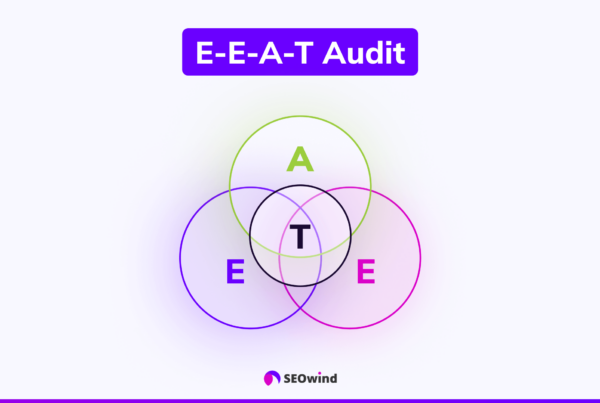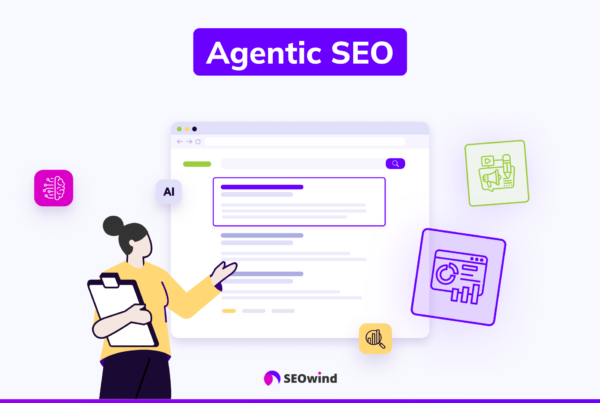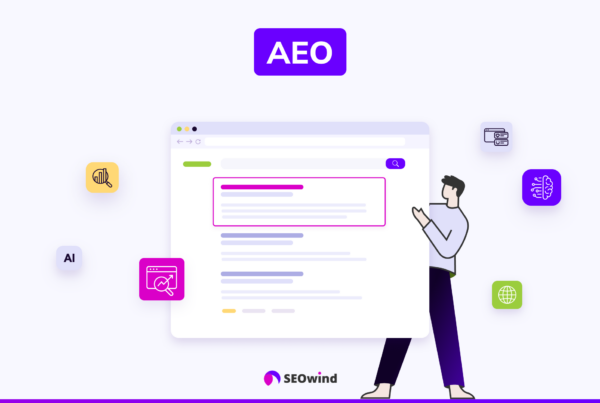Imagine scaling the peak of a metaphorical content marketing mountain laden with cumbersome equipment, such as planning tools, optimization techniques, and demanding data analysis. Now consider this journey with an intelligent entity by your side that clears thorny obstacles to pave a smoother path. This trusted companion is not a mountaineering Sherpa but something far more potent and radically transformative. It’s called Artificial Intelligence or AI. Let me guide you on this trailblazing adventure as we explore how integrating AI into your content marketing strategies can impact, empower, and unleash untapped potential.
What Is Artificial Intelligence in Content Marketing?
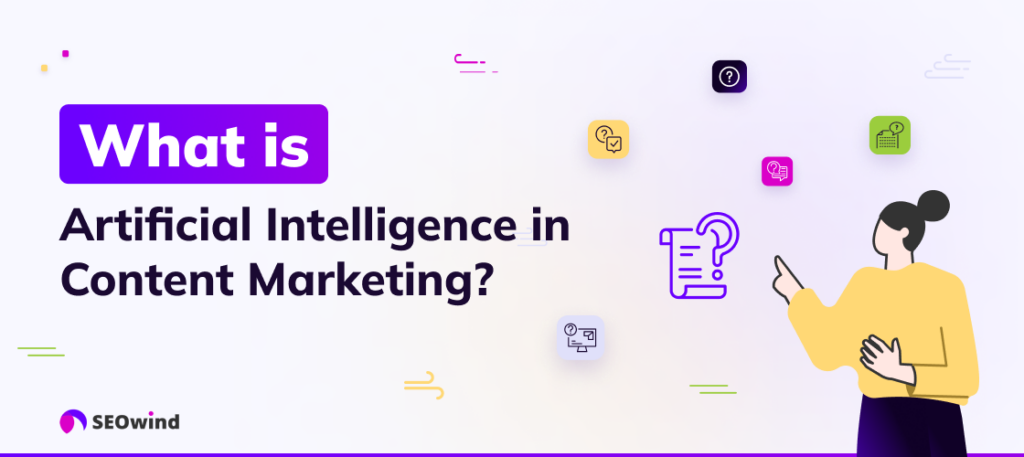
Definition of AI Content Marketing
Artificial Intelligence has been diversely applied across industries, sectors, and business functionalities. The marriage of AI with content marketing is a smarter way of reaching target audiences efficiently without compromising creativity.
AI content marketing uses Artificial Intelligence technologies to create, distribute, and optimize various content types like articles, blog posts, or social media updates. These technologies streamline tasks while enhancing personalization and performance tracking. The essence lies in automating repetitive activities while amplifying human endeavors to formulate varied, engaging narratives designed to hook your audience.
Benefits of AI Content Marketing
Unlocking the realm of AI content marketing might seem daunting at first, but the possibilities are sprawlingly exciting! Here is why you should implement it into your digital branding arsenal:
- Efficiency & Autonomy: Machines work around the clock, avoiding the trivial distractions humans endure daily. They can scan vast databases within seconds to provide curated findings, which could take ages manually.
- Predictive Analysis & Consumer Insight: Leveraging AI can sharpen predictive analysis strength, helping anticipate consumer behavior trends or market swings sooner than traditional methods.
- Personalized User Experience: By analyzing intricate user patterns and preferences via machine learning algorithms, content marketing AI can generate contextual and personalized content, resulting in more effective engagement rates.
- SEO Ranking: AI tools like Google’s RankBrain are altering the search engine landscape. Understanding these changes helps fine-tune your SEO strategies to stay at the op.
- Cost-Efficiency: While cutting-edge technology may appear pricey, evaluating resource time saved versus output quality often reveals greater returns on investment, making it a financially attractive path.
How is AI impacting content marketing?
Harnessing Artificial Intelligence in content marketing enables you to achieve high-quality results while augmenting human productivity.
To look more deeply, let’s dive into how AI impacts content marketing and how it’s revolutionizing the entire industry in significant ways.
The core impact of Artificial Intelligence in content marketing comes from its potential to automate otherwise tedious tasks while improving existing processes and results. For centuries, humanity has been developing machines to aid with laborious tasks. Today, we’re powering our creative engines – like content marketing – with profound technological tools such as AI.
A major facet of AI’s influence lies within data analysis. AI’s immense power allows it to sift through enormous quantities of data quickly and accurately. As AI content marketing gains traction, user preferences, behaviors, and trends are tracked at an unprecedented level, allowing tailored content to be created efficiently and with greater personalization than ever before.
Furthermore, thanks to AI, we no longer blindly strategize or craft our campaigns, hoping they’ll engage our desired audience. Most AI systems’ advanced predictive abilities have paved the way for improved decision-making by foreseeing user behavior and market trends.
Lastly, Artificial Intelligence isn’t just reshaping how we research or create content. It’s also transforming optimization and distribution. Intelligent algorithms ensure that your written material reaches its intended audiences effectively while delivering optimal engagement ratios.
In summary, AI
- Assists in rapid and precise data handling.
- Enables personalized content creation based on rich analysis.
- Empowers better decision-making through predictive capabilities.
- Optimizes content distribution, ensuring higher levels of engagement.
How to use AI in Content Marketing
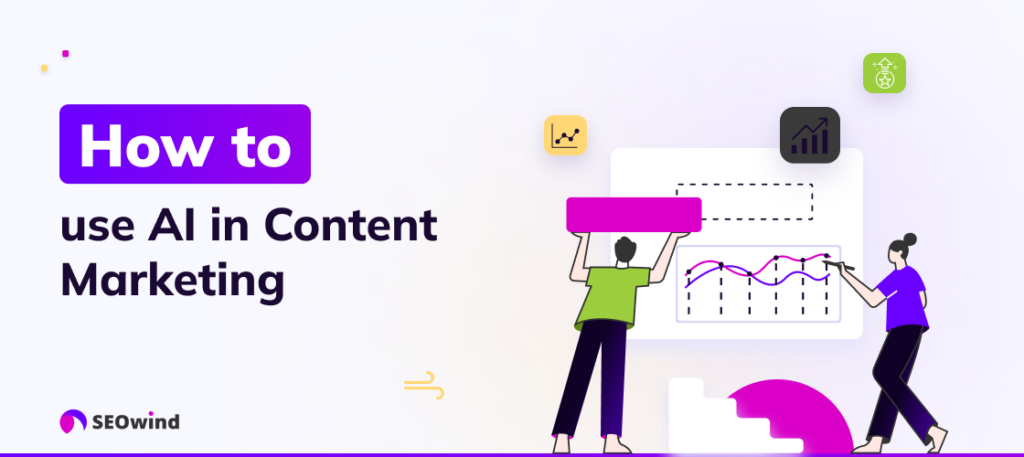
Artificial Intelligence has transformed the content marketing landscape, opening up a range of exciting possibilities. With the help of AI in content marketing, several aspects of content marketing have become more efficient and effective. Here are some central divisions that can significantly benefit from Artificial Intelligence.
Content Discovery and Curation Tools
One crucial aspect is the discovery and curation of relevant content. Finding useful material aligned with specified user attributes might seem like finding a needle in a haystack. However, with AI tools, this process becomes more straightforward.
Artificial Intelligence works tirelessly, scouring through immense data sources for appropriate content. Furthermore, as it learns the preferences and trends of your readership base over time, its effectiveness increases exponentially, providing even better-targeted suggestions. It’s incredible how AI can streamline your sourcing strategy while maintaining high-relevance controls!
Content Creation Tools
AI-powered tools also shine incredibly well when it comes to content creation, making them a pivotal part of AI content marketing initiatives. From crafting engaging blog posts to generating bespoke email campaigns, Artificial Intelligence facilitates the development of tailor-made content at scale.
For instance, GPT-3, OpenAI’s language prediction model, excels at producing human-like text based on specified parameters or initial phrases. Leveraging such advanced technology maximizes productivity and consistently maintains content quality.
Optimization Tools
Beyond mere creation lies optimization, another cornerstone of Artificial Intelligence within content marketing strategies.
AI-enabled utilities offer real-time insights on numerous variables influencing engagement, such as headline efficacy or optimal post timings, to optimize for success. They gauge reader reactions to various components, thus offering an explicit map guiding efficacious strategic decisions. This leads to one successful campaign after another, thanks to intelligent lessons learned from previous attempts.
Distribution Tools
A top-notch piece of content would still prove barren if not punctually placed before the right crowd. Enter stage distribution, which plays a huge role in content marketing and AI! Nowadays, marketers can use AI to schedule distribution across diverse channels.
Informed by user behavior analytics, these tools strategically publish your work during peak engagement times on appropriate platforms. This level of efficiency is setting new standards for reaching audiences effectively.
Reporting Tools
Finally, how effective can a strategy be when it lacks thorough analysis? With AI content marketing operations, reporting on campaign performance has become multidimensional and more insightful than ever.
Artificial Intelligence identifies patterns from vast data sets that were previously deemed indecipherable. By instantaneously processing large volumes of information, AI provides compelling narratives about your campaigns with clear indications of the strengths to bolster or weaknesses needing attention. This ultimately forms the roadmap for future planning.
AI empowers you to better understand your audience and their journey and enables agile modifications to campaigns based on analyzed metrics.
All these aspects combined validate why intelligent marketers must explore the tremendous potential of Artificial Intelligence for creating impressive content marketing ecosystems.
Steps for Implementing AI in Content Marketing Strategy
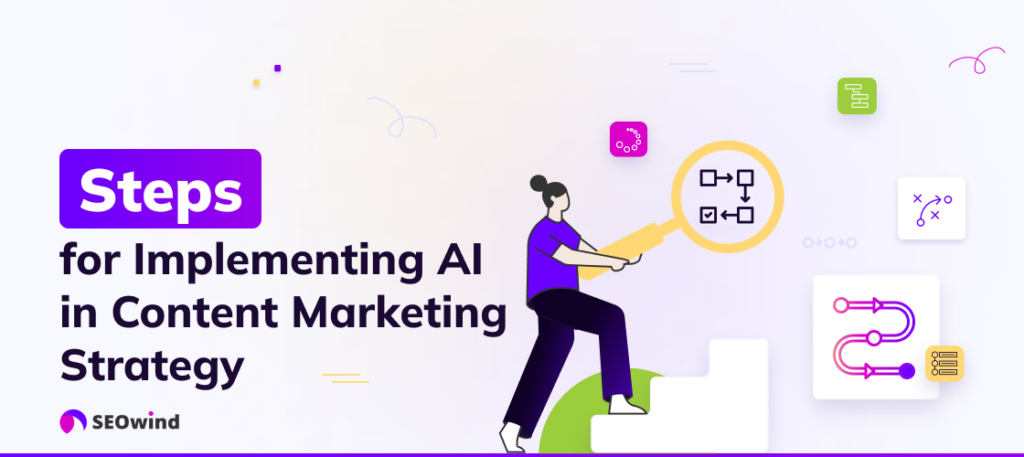
To unleash the full potential of AI content marketing, it’s necessary to integrate Artificial Intelligence into your content strategy. Here are some crucial steps you might consider:
Step 1: Identify Your Goals and KPIs
Examine your current content marketing goals and key performance indicators (KPIs). Are you looking to generate more leads? Increase audience engagement? Improve keyword rankings? Identifying these objectives will help tailor the application of AI towards achieving them.
Step 2: Evaluate Available AI Tools
Explore various AI content marketing tools available in the marketplace. Some focus on enhancing content discovery and curation, while others excel at distribution or analytics. Choosing a tool aligned with your business needs, budget constraints, and technical capabilities is vital.
Step 3: Pilot Test Selected Tools
Don’t go all-in immediately! First, conduct small-scale pilot testing using selected tools in controlled scenarios. This approach allows you to observe the tool’s efficiency and effect without investing heavily before understanding its full implications.
Step 4: Analyze Results And Adjust The Plan
Evaluate feedback from the trial phase and examine how well the tool has performed against initial expectations. Did it enhance user engagement? Was there an increase in lead generation? Use this feedback to adjust your strategy before implementing it across broader scopes.
Step 5: Monitor Progress
The power of AI lies not just in immediate results but also in its capacity for continuous learning and exponential improvement over time. Regularly monitor the impact of your technologically reinforced methods relative to traditional means and adapt your strategy as needed.
In short, integrating Artificial Intelligence in content marketing is not an overnight change. It’s a carefully executed journey that entails experimentation, analysis, and revisions until optimal interactions between human creativity and machine-led precision are achieved.
Best Practices for AI Content Marketing
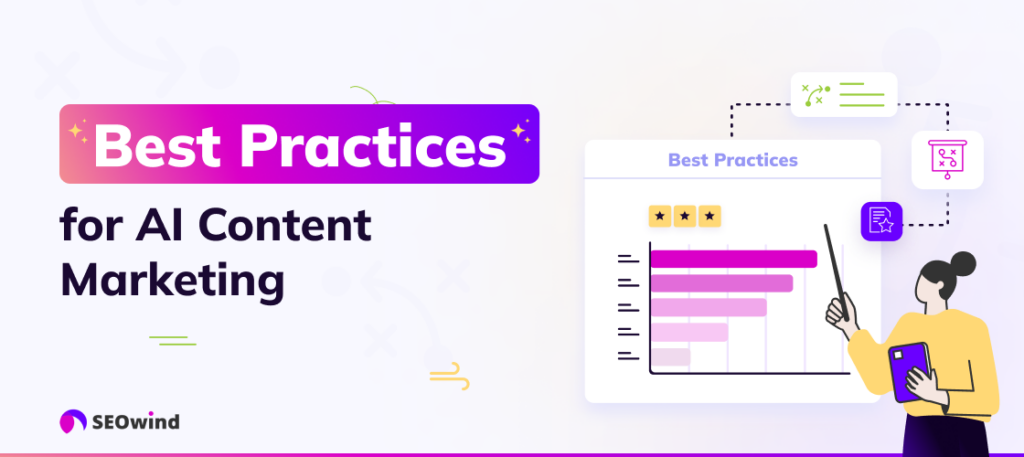
To unlock the full potential of AI content marketing, it’s imperative to follow some well-established best practices. By doing so, you can fully harness Artificial Intelligence in your content marketing strategy and enhance your effectiveness.
Research Your Audience and Market Demographics
Before creating targeted content, you’ll need to research your audience and understand market demographics! Trust me, this is something AI can make more effortless than ever. By using predictive analytics tools, such as visual recognition software or even chatbots on social media platforms, I can sense a sea of complex demographic data being translated into actionable insights!
With these tools, I have been able to better comprehend user behavior, gather accurate audience sentiment analyses, and predict trends with impressive accuracy. Knowing who you’re talking to will ultimately guide what kind of engaging and relevant content you create!
Generate Quality, Relevant, and Engaging Content
What good would polishing a dull rock do? The same principle applies when considering AI’s role in elevating the generation of quality content. Though algorithms and automated processes are beneficial, they’re only as valuable as the core material you provide.
By leveraging natural language processing (NLP) techniques integrated into various AI for content creation tools, we can develop high-quality, SEO-friendly, and highly readable output with minimal human effort!
Optimize Your Content for Search Engines and Social Media Platforms
It’s no secret that search engine optimization (SEO) is our ticket to securing optimal visibility within digital spaces like Google or Bing. Thankfully, advancements in AI tech have contributed significantly to efforts in SEO via continuous learning and improvement mechanisms inherent to algorithmic functions.
AI plugins effectively analyze key metrics like keyword density and readability scores and even suggest internal links to assist in optimizing your content. Concurrently, AI-powered social media management tools curate content that resonates with your intended audience and schedule posts for optimal engagement times! However, keep in mind that although powerful, these tools merely serve as facilitators. Genuine creativity remains solely human!
Create Automated Workflows for Publishing and Promotion
Let’s admit that maintaining a consistent publishing schedule can be cumbersome. But it’s an integral part of successful content marketing strategies. Luckily, by automating workflows using AI solutions, scheduling posts or sending promotional emails will no longer seem daunting.
By adopting robust AI software as a part of your strategy, you can ensure publishing consistency while spending more time on creative tasks rather than fretting over repetitive manual processes.
Leverage AI Insights to Improve Your Campaigns
Finally, remember that the power granted by Artificial Intelligence enables marketers like you and me to analyze the success of our campaigns down to minute details. By leveraging pattern recognition or AI systems’ predictive analytics capabilities, we’re equipped with binoculars peering toward future possibilities!
Keep an eye out for patterns in customer interactions and respond swiftly by making adaptive changes in real time. Take heed of these insights and let them guide revisions and improvements for better performance outcomes. After all, pinpointing areas of success or improvement via precise data-driven analyses is nothing short of a game-changer for boosting efficiency levels!
Challenges of Using AI in Content Marketing
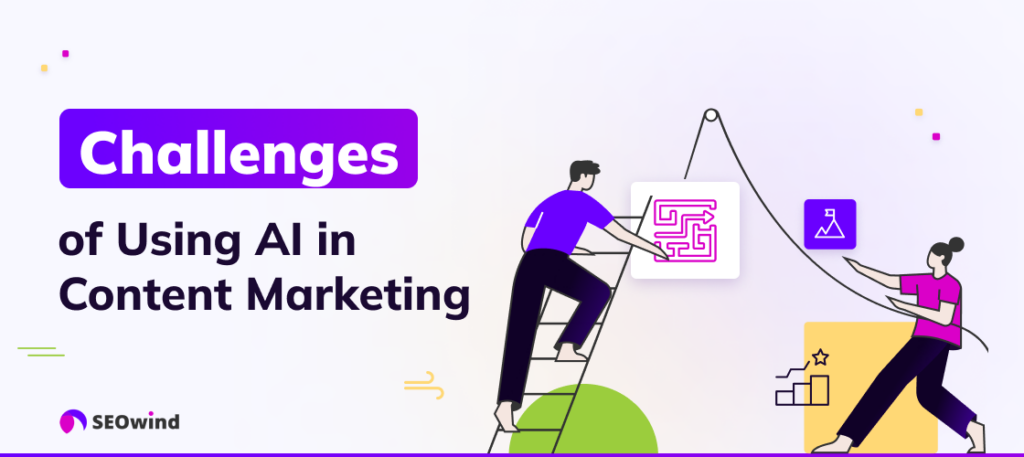
As beneficial as AI content marketing can be, it also comes with its fair share of challenges. From data quality issues to broader change management considerations, these obstacles to progress need to be addressed proactively.
Data Quality Issues
A key concern I often see is the quality of data in Artificial Intelligence in content marketing. Poor or inaccurate data can lead to misleading conclusions and mess up your marketing efforts. For instance, if customer behavior data is insufficiently tracked or collected from unreliable sources, AI analytics might suggest irrelevant or harmful strategies, defeating its purpose.
To ensure the accuracy and relevance of your AI-driven insights, you should:
- Regularly update your databases and cleanse them of outdated information.
- Use trustworthy sources for collecting new data.
- Promptly correct any identified inaccuracies.
Training Data Challenges
Training your AI models requires large volumes of high-quality, representative data. A lack thereof stunts their learning capabilities. To overcome this hurdle, consider collaborating with similar businesses on joint initiatives to gather shared datasets while ensuring not to infringe upon privacy regulations!
Interpretability Issues
Then there’s the ‘black box’ dilemma: understanding how an AI model arrives at a particular decision might be challenging due to its complex algorithms. Transparency about why certain content works better than others is essential in refining and perfecting our strategies.
Unfortunately, we may struggle to trust or learn from our AI tools without interpretability (the ability to comprehend how AI decisions are made). So, while it’s okay to let AI aid us, staying informed on how they work ensures we retain control over our campaigns.
Generalization Challenges
Next, let’s consider generalization challenges. Once trained on specific situations or datasets, AI systems tend to underperform when exposed to unseen conditions outside their training sets. This limits flexibility and can misguide marketers.
On the other hand, An AI model that generalizes too well might oversimplify details and overlook nuances. Balancing specificity and flexibility is a crucial task requiring continuous training, testing, and optimization.
Change Management Considerations
Finally, implementing AI in content marketing isn’t solely about the tech. It’s also about how fluently an organization can adapt to this change. This includes redesigning roles that machines will take over, managing anxieties among employees fearing obsoletion against AI, and guaranteeing everyone is trained to work effectively alongside Artificial Intelligence.
While the challenges of using AI for content creation are considerable, overcoming them is worthwhile! Proper data maintenance practices, emphasis on interpretability, ensuring balanced generalizability of models, and effective change management will all contribute to reaping the full benefits promised by AI content marketing.
Can I Use AI in Content Marketing?
Perhaps you’re reading this and wondering, “Can I personally use AI in content marketing?” The simple answer is yes. Artificial Intelligence is no longer confined to the echelons of giant tech corporations. Today, it has permeated virtually all aspects of digital marketing, including content marketing.
Let’s look at a few ways you can leverage this futuristic tool confidently and effectively:
Using AI for content creation: Many automated tools employ machine learning and natural language processing to create content. You can utilize these algorithms to generate creative headlines, craft captivating social media posts, or even write blog articles comprising thousands of words.
Content curation and discovery: With an ocean of data out there, finding pertinent information can be like searching for a metaphorical needle in the haystack. This is where AI comes into play, helping you discover relevant content from across the web that resonates with your audience’s interests.
AI puts critical consumer behavior insights within reach. By analyzing patterns in user data like click-through rates and time spent on pages, AI provides marketers with invaluable information about what kind of content draws engagement, essentially serving as a compass guiding your strategy toward success.
Optimization Tools — Mastering the SEO Chess Game: SEO is akin to playing chess; both require strategic moves to win. Some artificially intelligent help can give you an edge over others by signaling which keywords to aim for or identifying backlink opportunities.
Not only can you use Artificial Intelligence in content marketing, but embracing it may prove crucial for staying competitive in today’s rapidly digitizing world. Adopting advanced technologies like AI into your strategy gives you an eagle-eye view, delivering personalized experiences to your customers while saving time and resources.
